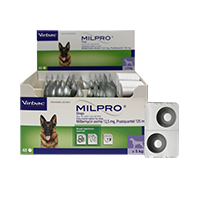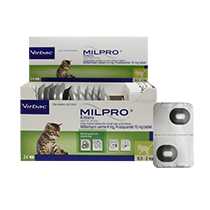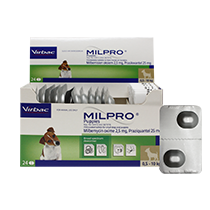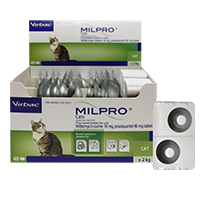
What you need to know about your pets and worms
What types of worms infect your pet?
-
Tapeworms
-
Hookworms
-
Spirocerca lupi
-
Roundworms
Flea control is critical in the management and prevention of tapeworm infections. This involves treating your dog and the environment . Break the cycle by deworming your pets on a three monthly basis and deworm everyone in the house incl yourself. Use an effective flea treatment that not only kills adult fleas but also offers protection against the developing immature life-cycle in the environment.
Tapeworm is an intestinal parasite - this flat, segmented worm is found in dogs, cats, humans, and many other species.
The tapeworm uses its hook-like mouthparts to attach to the wall of the small intestine. The adult worms may reach up to 30 cm in length. As the adult matures, individual segments, called proglottids, are passed in the faeces of an infected dog. As the proglottid dries, it becomes a golden colour and eventually breaks open, releasing the fertilised eggs into the environment. A proglottid may contain as many as 20 tapeworm eggs. Tapeworms must first pass through an intermediate host (like a flea) before they can infect a dog. Dogs get tapeworms from eating an infected flea or raw/ undercooked met e.g. pork. A person must swallow an infected flea to become infected with tapeworm. A few cases of tapeworm infection have been reported in children. Vigorous flea control will also eliminate any risk of children becoming infected. It’s important to treat your pet before the worms do damage to their body. The good news is that the treatment for tapeworms is very effective and simple. The best way to avoid a tapeworm infection is to keep your pet and environment free from flea infestations and ensure that meat being consumed must be cooked properly. Understanding how the lifecycle of a tapeworm works, will make it evident that treating the flea infestation and regular deworming will keep your pet and your household tapeworm free. Yes, tapeworms can be transmitted from pets to humans! Deworm your puppy with every vaccination and and thereafter every 3 - 4 months in order to break the cycle.
Symptoms of tapeworm infestations in puppies include a clinical diagnosis that is made by observing the white, mobile tapeworm segments in the faeces or crawling around the anus. These segments look like grains of rice or cucumber seed. Occasionally segments are seen crawling around the dog’s anus. Occasionally the entire adult tapeworm can be passed in the faeces or vomited up it it migrated to the stomach.
Hookworms are nasty little worms that can do a lot of damage to your pet, which is why it is important for pet owners to deworm their pets.
They literally hook themselves into the lining of your pet’s intestines and to feed on the tiny blood vessels in the intestinal lining. Despite their small size, only 3 millimetres in length, this feeding parasite can lead to severe anaemia.
Treating and catching hookworms early can save your pet's life. Mothers pass hookworms to their young, either through the uterus or the mother's milk when nursing. Hookworms are one of the most significant intestinal parasites of a puppy. As a result of this blood-sucking, hookworms can cause severe anemia. It is not uncommon for young puppies to die from severe hookworm infections. Hookworm infested areas are a huge risk for children - strict hygiene is important, especially for children. Understanding how the lifecycle of a hookworm works and regular deworming will keep your pet and their young hookworm free. Deworm your puppy with every vaccination and and thereafter every 3 - 4 months in order to break the cycle.
Symptoms of Hookworm infestations in puppies include
-
Severe anaemia
-
Intestinal distress
-
Significant weight loss
-
Bloody diarrhoea
-
Dull and dry hair coat or failure to grow properly
-
Coughing
-
Skin irritation, especially of the paws
Spirocerca lupi [S lupi] is a worm that has dogs as its definitive host and forms a nodule within the lower oesophagus. Spirocerca Lupi is also known as the silent killer and has an ongoing lifecycle that could have drastic consequences for your dog.
This disease is not always that easy to diagnose. It causes respiratory problems, vomiting [active] or regurgitating [passive], acute death from a bleeding aortic aneurysm, Maries disease [swollen feet] and sialadenosis [a condition where the salivary glands enlarge]. The nodule can also become cancerous and this cancer can then spread throughout the body. Killing the worm cannot cure clinical signs in dogs with nodules that have become cancerous. These dogs require surgical and medical treatment. It is imperative to break the cycle through regular deworming. Deworm your puppy with every vaccination and and thereafter every month in order to break the cycle.
Symptoms of S Lupi infestations in puppies include
-
Vomiting and/or regurgitation
-
Change in breathing (panting, coughing, retching)
-
Increased salivation and enlarged salivary glands
-
Weight loss
-
Fever
-
Lethargy/weakness
-
Pale gums and lips - due to bleeding from the nodules
-
Swollen feet
Roundworms are Internal parasites that can be a serious problem in young puppies. Intestinal worms are detrimental to your and your puppy's health if not treated. Almost all dogs become infected with roundworms at some point, usually as puppies.
Roundworms live in the intestines and do not require an intermediate host to spread from dog to dog, but can be transmitted by ingestion of eggs that are shed in the faeces of infected dogs. Roundworms spread easily. One roundworm can produce up to 85,000 eggs a day. Roundworms also pose a significant risk to humans, especially pregnant women and children, causing eye, lung, heart and neurologic problems. Deworm your puppy with every vaccination and and thereafter every 3 - 4 months in order to break the cycle
Symptoms of Roundworms infestations in puppies include
-
Potbelly
-
-Weakness
-
Diarrhoea
-
Vomiting
-
Belly pain
-
Dull coat
-
-Weight loss
-
Malnourishment
There are many ways your pet can become infected with worms
-
Walking on infested soil
-
Swallowing fleas
-
Nursing from an infected mother
-
Hunting mice or birds
-
Eating raw meat
Regular deworming is highly recommended to keep your pets free from internal parasites. If regular deworming is used, animals should be treated at least 4 times a year, with no more than 3 months between each treatment. Puppies and kittens need more aggressive deworming, starting at the early age of 2 weeks. Using an effective, broad spectrum dewormer such as Milpro, that targets tapeworm, roundworms, hookworms and Spirocerca Lupi, is imperative for your pets health. And of course, don't forget your family's health! Deworming your family is just as important, as tapeworms can be transmitted from pets to humans
Adult dogs or cats should be dewormed every 3 months
Puppies and kittens can safely be dewormed from 2 weeks of age. They will be dewormed with every vaccination to break the life cycle of worms. Thereafter they can be dewormed every 3 months.
Did you know that most spot-on treatments are not effective against tapeworm infections?
Parasitic worms pose a threat to the animals we love, and some even pose a threat to us. That is why it is important to start protecting pets early and continuing prevention throughout the course of their lives. Milpro effectively treats hookworms, roundworms, tapeworms and helps prevent against Spirocerca Lupi infections. Milpro offers you an effective deworming treatment plan that is:
-
A broad spectrum, film coated tablet for dogs and cats
-
Small in size
-
Specifically designed to be picked up easily
-
Easy to administer
-
Flavoured and highly palatable
-
Broad spectrum parasite control including tapeworms and aiding in the prevention of S.lupi
-
Cost-effective option for keeping your pet protected
MILPRO is available from your local vet or online vet store.
THANK YOU FOR BEING A RESPONSIBLE PET OWNER





